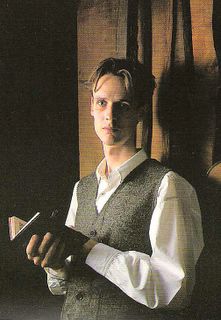Review: Ian Bostridge and Julius Drake
We visited newly-reopened Memorial Hall at UNC last night for a Schubert recital by tenor Ian Bostridge and pianist Julius Drake. Tomorrow night they will be at the Kennedy Center.
Hall: the improvements (primarily airconditioning, appreciated on a muggy, rainy night though an HVAC hum could be heard during hushed moments) cost $13.9 million. The brightly starry new carpet made one person in bifocals stumble. Nice paint job!
Sound: the announcer's voice was distorted through his cordless mic. After that, things looked up. Bostridge was blessedly clear and audible even at his quietest. On the other hand, from orchestra row N - or was it P? we had a peaceful debate about that with the older couple who were sitting in our seats - the sound of the piano was muffled.
Texts and translations were provided and the house lights were left up so we could read them.
 The singer: Bostridge, who has an atypically dark voice for a tenor, was vocally stiff at first, forcing an edgy vibrato at the ends of phrases, but right off the bat he was fun to watch. Tall and thin (one comment: "Just to see him was to want to offer him a sandwich"), he struck a rotating sequence of languishing poses while channeling the extreme, miserable, narcissistic introversion of these German romantic poets, about whom more below.
The singer: Bostridge, who has an atypically dark voice for a tenor, was vocally stiff at first, forcing an edgy vibrato at the ends of phrases, but right off the bat he was fun to watch. Tall and thin (one comment: "Just to see him was to want to offer him a sandwich"), he struck a rotating sequence of languishing poses while channeling the extreme, miserable, narcissistic introversion of these German romantic poets, about whom more below.Bostridge: "I try to bring a sense of theater to what I do on a Lieder stage — it's really like a minimalist, monologue theater."
Speaking of the singer he emulates, Fischer-Dieskau, Bostridge said admiringly: "You never feel that he is preening himself over his voice: he's always trying to tell you something really urgent."
He only looked right at us once, while singing the word "death." Perhaps his manner has changed in response to reviewers' comments that he frightens audiences with his beady stare. The rest of the time he faced the floor, the ceiling, the far distance, his inner angst.
The quiet passages were enchanting. His diction is beautiful; every syllable could be heard. Semi-swooning over the Friedrich Rückert songs at the start of the second half, so full of colors and emotion, I understood why Bostridge has fanclubs full of adoring young girls.
However, at the other dynamic extreme (the overwrought one), Bostridge had only the "loud" crayon in his box.
To switch media, here is a remembered caution from a long-ago art class: if you are using a light pencil, most of your drawing needs to be light, because as dark as your pencil will draw is all the darkness there is. You don't get it darker by scribbling over and over the same spot. Bostridge does not have power and wildness, but goes frequently to his max and bellows away - lightly.
| "You can't stand there singing prettily," he said. "You have to seize the audience and not let go until you leave the stage. You have to burn. If you don't, it's a waste of time. Why bother?" |
Burning suits this German romantic poetry, probably written by idle young men who were not getting enough sex. If I'd been their mother I would have suggested: change out of that silly velvet smoking jacket and go get a job. Or play a rousing game of basketball with your other miserable friends. Or why don't you ask that nice girl you keep mooning over if she'd like to go have some ice-cream with you?
No. They wandered anguished and alone along mountain paths - or maybe they lay limply at the spa at the foot of the mountain and merely looked up at the peaks. This last was the suggestion of my companion, who had hoped in these nature lyrics to find an iconic fisherman-poet or two. However, I felt sure these lads had never fished when I read:
| With his song the fisherman bids the golden sun awake. He sings at his work from a full, vigorous heart. |
No! Fishermen, sneaking off to their jealously-guarded secret spots in the dead of night, insist on complete quiet. I have never seen a singing fisherman.
As for my friend, he gave up on the fisherman-poet idea at this point:
| An angler with his rod stood on the bank Cold-bloodedly watching the fish's contortions. As long as the water is clear, I thought, He won't catch the trout with his rod. But at length the thief grew impatient. Cunningly he made the brook cloudy and in an instant his rod quivered, and the fish struggled on it. |
Even I, who don't fish, know the "Cloudy Brook Technique" doesn't work.
Technorati Tags: Review, Music, Schubert, Bostridge
Labels: music



 A few of my daughter
Melina's great posts:
A few of my daughter
Melina's great posts:








0 Comments:
Post a Comment
<< Home